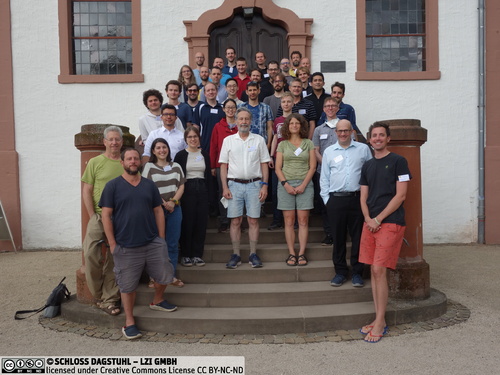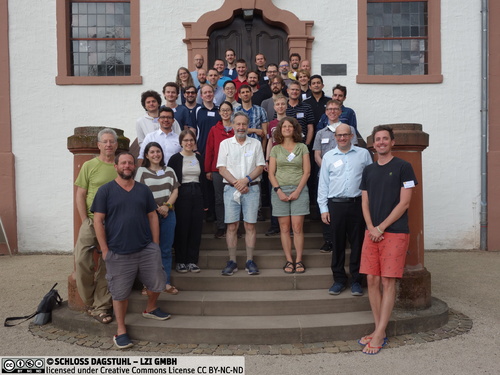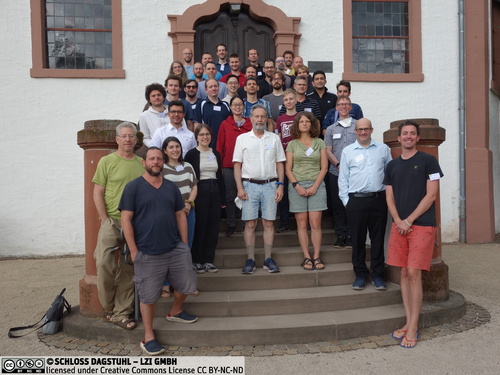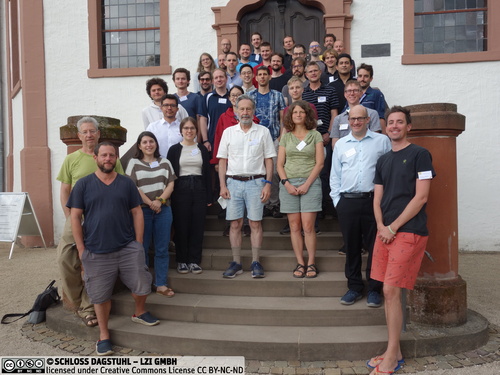Dagstuhl Seminar 22271
Algorithms for Participatory Democracy
( Jul 03 – Jul 08, 2022 )
Permalink
Organizers
- Markus Brill (TU Berlin, DE)
- Jiehua Chen (TU Wien, AT)
- Andreas Darmann (Universität Graz, AT)
- David Pennock (Rutgers University - Piscataway, US)
Contact
- Marsha Kleinbauer (for scientific matters)
- Jutka Gasiorowski (for administrative matters)
Impacts
- Pandering in a (flexible) representative democracy : article in UAI '23 : Proceedings of the Thirty-Ninth Conference on Uncertainty in Artificial Intelligence - Sun, Xiaolin; Masur, Jacob; Abramowitz, Ben; Mattei, Nicholas; Zheng, Zizhan - New York : ACM, 2023. - 11 pp..
- Approval-Based Committee Voting in Practice : A Case Study of (Over-)Representation in the Polkadot Blockchain - Boehmer, Niclas; Brill, Markus; Cevallos, Alfonso; Gehrlein, Jonas; Sanchez-Fernandez, Luis; Schmidt-Kraepelin, Ulrike - Cornell University : arXiv.org, 2023. - 32 pp..
- Mitigating Skewed Bidding for Conference Paper Assignment : article in AAMAS '23 : Proceedings of the 2023 International Conference on Autonomous Agents and Multiagent Systems - Rozenzweig, Inbal; Meir, Reshef; Mattei, Nicholas; Amir, Ofra - New York : ACM, 2023. - pp. 573–581.
- Social Mechanism Design : A Low-Level Introduction : AAMAS '23: Proceedings of the 2023 International Conference on Autonomous Agents and Multiagent Systems - Abramowitz, Ben; Mattei, Nicholas - New York : ACM, 2023. - pp. 2472–2474.
Schedule
Participatory democracy aims at a broad and direct participation of citizens in policy decision making, enabling a large fraction of citizens to propose ideas, debate issues, and vote on decisions. Modern-day participatory democracy processes entail several kinds of algorithmic challenges. This seminar focused on the algorithms underlying three types of participatory democracy systems: (1) online decision-making platforms for governments and organizations (such as LiquidFeedback or decidim), (2) participatory budgeting processes that enable citizens to directly and collectively decide how to spend tax dollars, and (3) collective decision-making systems involving currency. We also had dedicated sessions discussing algorithmic challenges related to liquid democracy and the relation between participatory democracy and blockchain technology. Working groups have been initiated discussing partial participation in voting mechanisms, the use of currency in social choice problems, participatory budgeting, and the impact of computational social choice.
The technical program was complemented by a demo session in which Jobst Heitzig demonstrated vodle (http://www.vodle.it) and Daniel Reeves demonstrated Beeminder (https://www.beeminder.com/) and other decision-making tools. Moreover, we organized a panel discussion on The Past, Present, and Future of Computational Social Choice, moderated by Piotr Faliszewski. In this panel discussion, Haris Aziz, Edith Elkind, Jérôme Lang, and Bill Zwicker gave their perspectives on the development of the field of COMSOC.
The organizers thank all participants for their interesting ideas and viewpoints presented in talks, discussions, and informal meetings. Moreover, we would like to express our gratitude towards Schloss Dagstuhl and its staff for all the support before and during the seminar, which contributed to making this seminar a successful one.
 Markus Brill, Jiehua Chen, Andreas Darmann, and David Pennock
Markus Brill, Jiehua Chen, Andreas Darmann, and David Pennock
Participatory democracy aims to make democratic processes more engaging and responsive by giving all citizens the opportunity to participate and express their preferences at many stages of decision-making processes beyond electing representatives. Enabled by modern information and communication technology, recent years have witnessed an increasing interest in participatory democracy systems. Participation at scale, however, gives rise to a number of algorithmic challenges. In this Dagstuhl Seminar, we will study algorithms for online decision-making platforms and for participatory budgeting processes. We will also explore how the use of currency within social choice can be employed to improve participatory decision-making systems.
In order to tackle the algorithmic challenges of modern-day participatory democracy, this Dagstuhl Seminar brings together methods, viewpoints, and approaches from different scientific fields such as computer science and economics, and, in particular, from computational social choice. The topics to be discussed in working groups as well as in both theory and practice talks include, but are not limited to:
- aggregation methods in online decision-making platforms;
- dynamic and strategic aspects of liquid democracy;
- proportional representation in participatory democracy systems;
- modeling complex preferences and incorporating fairness notions in participatory budgeting;
- computational complexity of aggregation processes for different preference formats;
- market-based approaches to the design of participatory budgeting elections;
- aggregation of information prior to elections by the use of currency (e.g., by means of prediction markets or wagering mechanisms);
- use of virtual currency to express utilities across candidates (e.g., by applying quadratic voting).
The goal of this Dagstuhl Seminar is to stimulate interaction between experts in computational social choice and related fields, and to promote an exchange of ideas between researchers and practitioners. The great atmosphere of a Dagstuhl Seminar, with informal meetings and social activities besides talks and working groups focused on specific topics, offers a unique possibility to bundle and bridge diverse research activities. This seminar aims to establish participatory democracy as a novel and socially relevant application area for computational social choice.
 Markus Brill, Jiehua Chen, Andreas Darmann, and David Pennock
Markus Brill, Jiehua Chen, Andreas Darmann, and David Pennock
- Ben Abramowitz (Tulane University - New Orleans, US)
- Haris Aziz (UNSW - Sydney, AU) [dblp]
- Dorothea Baumeister (Heinrich-Heine-Universität Düsseldorf, DE) [dblp]
- Gerdus Benade (Boston University, US)
- Robert Bredereck (TU Clausthal, DE) [dblp]
- Markus Brill (TU Berlin, DE) [dblp]
- Alfonso Cevallos (Web3 - Zug, CH)
- Andreas Darmann (Universität Graz, AT) [dblp]
- Théo Delemazure (University Paris-Dauphine, FR)
- Edith Elkind (University of Oxford, GB) [dblp]
- Piotr Faliszewski (AGH University of Science & Technology - Krakow, PL) [dblp]
- Rupert Freeman (University of Virginia, US)
- Ashish Goel (Stanford University, US) [dblp]
- Paul Gölz (Carnegie Mellon University - Pittsburgh, US)
- Umberto Grandi (University Toulouse Capitole, FR) [dblp]
- Matthias Greger (TU München, DE)
- Davide Grossi (University of Groningen, NL) [dblp]
- Jobst Heitzig (Potsdam-Institut für Klimafolgenforschung (PIK), DE)
- Ayumi Igarashi (National Institute of Informatics - Tokyo, JP) [dblp]
- Anson Kahng (University of Rochester, US)
- Christian Klamler (Universität Graz, AT) [dblp]
- Sonja Kraiczy (University of Oxford, GB)
- Martin Lackner (TU Wien, AT) [dblp]
- Jérôme Lang (CNRS - Paris, FR) [dblp]
- Nicholas Mattei (Tulane University - New Orleans, US) [dblp]
- Reshef Meir (Technion - Haifa, IL) [dblp]
- Stefan Napel (Universität Bayreuth, DE) [dblp]
- Arianna Novaro (Université Paris I, FR) [dblp]
- David Pennock (Rutgers University - Piscataway, US) [dblp]
- Dominik Peters (University Paris-Dauphine, FR) [dblp]
- Marcus Pivato (University of Cergy-Pontoise, FR) [dblp]
- Clemens Puppe (KIT - Karlsruher Institut für Technologie, DE) [dblp]
- Daniel Reeves (Beeminder - Portland, US)
- Simon Rey (University of Amsterdam, NL)
- Ulrike Schmidt-Kraepelin (TU Berlin, DE) [dblp]
- Ehud Shapiro (Weizmann Institute - Rehovot, IL) [dblp]
- Sofia Simola (TU Wien, AT)
- Nimrod Talmon (Ben Gurion University - Beer Sheva, IL) [dblp]
- Jens Witkowski (Frankfurt School of Finance & Management, DE) [dblp]
- William S. Zwicker (Istanbul Bilgi University, TR) [dblp]
Classification
- Artificial Intelligence
- Computer Science and Game Theory
- Computers and Society
Keywords
- computational social choice
- online decision-making platforms
- participatory budgeting
- voting with currency





 Creative Commons BY 4.0
Creative Commons BY 4.0
